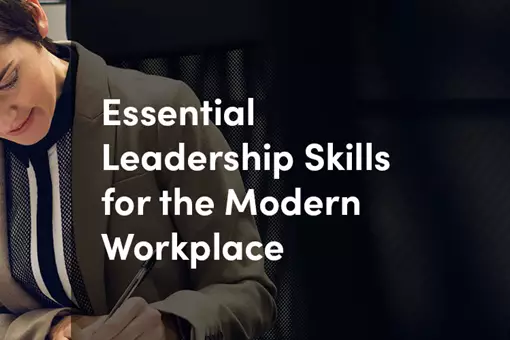Essential Leadership Skills For The Modern Workplace
- 17th September 2025
- Written by LSBF Staff
- Online Learning

What Are Leadership Skills?
In today's fast-paced, digital world, effective leadership is a core competency. Essential leadership qualities allow an individual to guide and motivate others toward a common goal. They are not about having authority, but about building trust, fostering collaboration, and creating an environment where everyone can thrive. Essential leadership skills are a cornerstone of success.
Different Types of Leadership Skills
The most effective leaders possess a diverse range of abilities. Varying types of leadership skills include:
-
Interpersonal Skills: The ability to communicate, listen, and empathise with others.
-
Strategic Skills: The ability to think critically, plan for the future, and solve complex problems.
-
Managerial Skills: The ability to organise tasks, delegate responsibilities, and manage resources efficiently.
-
Technical Skills: The specific knowledge required for a particular industry helps a leader understand their team’s work.
Tips to Improve Your Leadership Skills at the Workplace
Developing your leadership qualities is a continuous journey. You can improve by:
-
Seeking Mentorship: Find a leader you admire and learn from their experiences.
-
Taking a Leadership Course: Enrol in a formal leadership course to learn new frameworks and strategies.
-
Practising Active Listening: Pay close attention to what your colleagues say to build trust and understanding.
-
Asking for Feedback: Regularly seek input on your performance to identify areas for growth.
-
Taking on New Projects: Volunteer for opportunities that push you out of your comfort zone and allow you to practise leadership.
Who Really Needs Leadership Skills, and Is There a Degree for It?
Everyone can benefit from leadership and leadership skills in the workplace. While traditional leadership roles often fall to managers, the ability to influence and inspire is valuable at every level. While there isn't a specific "leadership degree," many programmes focus on building leadership skills. A dedicated leadership development programme, such as those provided by London School of Business and Finance (LSBF) can provide the training needed to excel. Many universities and institutions provide certifications or master’s degrees focused on leadership and management.
The Impact of Good Leadership on Workplace Success
Strong leadership is the engine driving an organisation forward. The benefits of leadership development have a profound impact on a company’s success, leading to significant improvements across the board.
-
Increased Productivity: A good leader inspires a team to be more engaged and focused, leading to higher output.
-
Improved Decision-Making: Leaders who possess strong analytical skills make informed choices that benefit the entire organisation.
-
Stronger Organisations: Effective leadership creates a positive culture, which reduces turnover and strengthens the company’s foundation.
-
Increased Innovation: Leaders who encourage creativity and collaboration unlock new ideas and solutions.
-
Better Employee Engagement: When employees feel supported and valued by their leaders, they are more motivated and committed to their work.
Find out more about the importance of leadership development.
Examples of Leadership Skills in the Workplace
To understand what makes a good leader, consider these fundamental leadership skills examples:
-
Effective Communication: The ability to articulate a vision and listen to feedback.
-
Adaptability & Embracing Change: Being able to adjust to new situations and lead a team through transition.
-
Self-Awareness: Understanding your own strengths and weaknesses.
-
Critical Thinking: Analysing information to make sound judgments.
-
Problem-Solving: Identifying issues and creating solutions.
-
Collaboration & Team Building: Fostering a cohesive team environment where members support one another.
-
Technologically Skilled: Staying current with new technologies to improve efficiency.
-
Reliability and Trust: Being a dependable leader who keeps their word.
-
Strategic Thinking: Planning for the future and seeing the bigger picture.
-
Creativity: Encouraging new ideas and innovative approaches.
FAQs
Why are leadership skills important in the modern workplace?
Leadership skills are crucial for navigating a complex, fast-paced world. They help organisations innovate, adapt to change, and keep employees engaged.
What makes a good leader in the modern workplace?
A good leader is a great communicator, adaptable, empathetic, and technologically skilled. They focus on building strong teams and fostering a positive, collaborative culture.
Do leadership skills differ for remote and in-office teams?
Yes. While the core principles are the same, remote leaders must be exceptionally skilled in communication and building a sense of community across a digital divide.
How do modern leaders handle workplace conflicts?
Modern leaders act as mediators, addressing issues directly and encouraging open communication. They focus on finding common ground and fostering mutual respect.
What’s the best way to start improving leadership skills?
Start with self-awareness. Identify your strengths and weaknesses, then seek out targeted opportunities to practise and grow. Enrolling in a leadership development programme, such as those offered by LSBF is a great way to kickstart your journey.
Image Credit: Freepik
Other news from Online Learning
Everything You Need To Know About Doing an Online MBA in Oil and Gas Management from UK
A Master of Business Administration (MBA) in Oil and Gas Management is a specialised postgraduate degree that combines high-level business…
Everything You Need to Know About the Online Mini MBA
A Mini-MBA is an intensive, executive education programme, providing a foundational understanding of key business and management concepts. Unlike a…
Essential Leadership Skills For The Modern Workplace
Everyone can benefit from leadership and leadership skills in the workplace. While traditional leadership roles often fall to managers, the…




